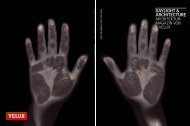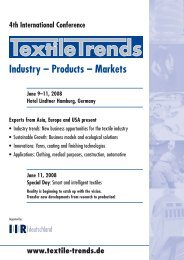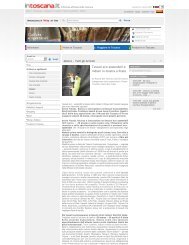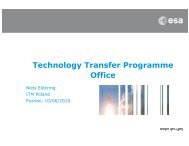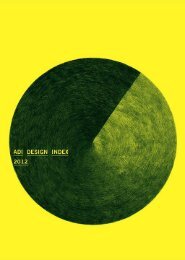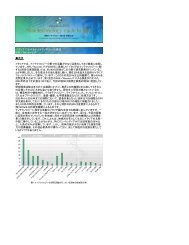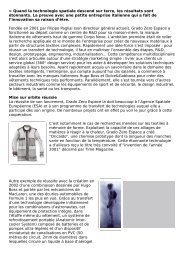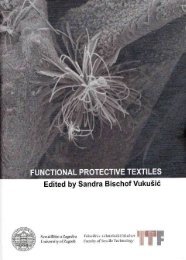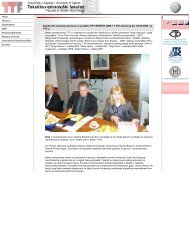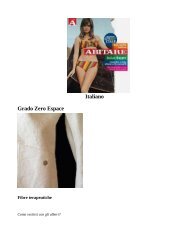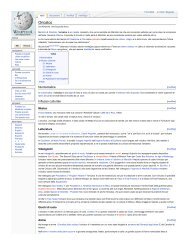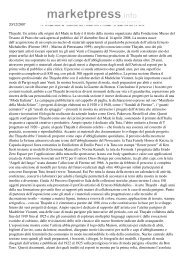Performance Apparel Markets - Grado Zero Espace Srl
Performance Apparel Markets - Grado Zero Espace Srl
Performance Apparel Markets - Grado Zero Espace Srl
Create successful ePaper yourself
Turn your PDF publications into a flip-book with our unique Google optimized e-Paper software.
<strong>Performance</strong> <strong>Apparel</strong> <strong>Markets</strong>, 1st quarter 2006<br />
Fast track: environmental issues for performance apparel<br />
Oeko-Tex 100 also covers fibres,<br />
textiles and accessories<br />
mattresses and furnishing fabrics.<br />
As well as finished garments, components such as fibres, yarns,<br />
fabrics and accessories may be certified with Oeko-Tex 100.<br />
Oeko-Tex also runs an<br />
accreditation system, and<br />
has issued 50,000<br />
certificates to around<br />
6,500 companies<br />
The organisation has<br />
embarked on a campaign<br />
to publicise its<br />
environmental services to<br />
the US market<br />
Environmental issues will<br />
become more important<br />
in the USA<br />
USA-based outdoor<br />
apparel specialist<br />
Patagonia is renowned for<br />
its dedication to<br />
environmental issues<br />
Patagonia is also a<br />
founding member of “1%<br />
For The Planet”<br />
Mr Chouinard is always<br />
looking for eco-friendly<br />
ways to make sportswear<br />
The most damaging<br />
apparel fibre is<br />
industrially grown<br />
cotton, which has a high<br />
concentration of<br />
pesticides<br />
Oeko-Tex also runs an accreditation system for environmentallyfriendly<br />
factories, known as Oeko-Tex 1000. Since 1992 Oeko-Tex<br />
has issued 50,000 certificates to around 6,500 companies. Almost<br />
two-thirds of these companies are based in Europe and many of the<br />
remaining third are based in Asia. Moreover, Oeko-Tex reports that<br />
interest in certification is growing fastest in Asia.<br />
The organisation has recently embarked on a campaign to publicise its<br />
environmental services to the US market. These include a seminar for<br />
textile manufacturers which was held in New York in November<br />
2005. At the seminar, Patricia Aburdene, the author of Megatrends<br />
2010, introduced the term “values-driven consumer” to describe the<br />
63 mn consumers in the USA which she estimates feel strongly about<br />
the environment.<br />
Ms Aburdene predicts that, over the next few years, environmental<br />
issues will become more important in the USA in a way which will<br />
be similar to the developments experienced in Europe in the late<br />
1990s.<br />
PATAGONIA—AN ENVIRONMENTAL LEADER<br />
Patagonia is a USA-based outdoor apparel specialist. The company,<br />
founded by Yvon Chouinard, is renowned for its dedication to<br />
environmental issues. In November 2004 Fortune magazine named<br />
Yvon Chouinard as one of its “innovation entrepreneurs”. Mr<br />
Chouinard summarises his philosophy as “earth first, profits second”.<br />
Patagonia is a founding member of “1% For The Planet”—an alliance<br />
of companies which contribute 1% of their net annual sales to<br />
environmental groups. The alliance was founded in 2001 and now has<br />
235 members.<br />
Mr Chouinard is always looking for eco-friendly ways to make<br />
sportswear—for example, by using pesticide-free cotton and using<br />
recycled bottles to make jackets.<br />
Patagonia conducted an analysis in the mid-1990s of all the different<br />
fibres it used in making apparel. The most damaging was found to be<br />
industrially grown cotton, which had a high concentration of<br />
pesticides. Indeed, 10% of all agricultural chemicals consumed in the<br />
USA are used to produce cotton. Such chemicals include synthetic<br />
fertilisers, soil additives, defoliants and pesticides.<br />
6 © Textiles Intelligence Limited



